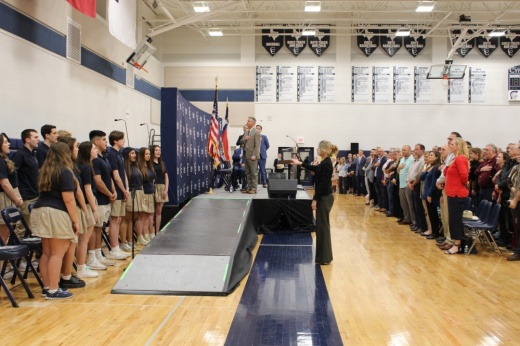Among the governor’s top seven emergency items for this legislative session is expanding school choice, which is “vital to the future of our state,” he said at the event.
“The reason why I'm traveling around the entire state of Texas is because not at every school are mom and dad in charge. In fact, in some schools, mom and dad are pushed out of the way,” he said. “My job is to make sure we get across the finish line a piece of legislation that will return mom and dad to being in charge of their child's education.”

To accomplish this goal, Abbott said he wants to introduce a universal education savings account program in Texas. This means families of pre-K-12 children who are eligible to attend public schools would also be eligible to apply for state funding that could be used to cover education-related expenses such as private school tuition. Such programs are sometimes referred to as school vouchers.
Abbott said during the COVID-19 pandemic, many parents noticed their children’s curriculum for the first time and learned “that kids are having woke agendas pushed on them by teachers in their schools.”
Having grown up in small Texas towns attending public schools, Abbott said he remembers being taught the “basics” of reading, writing, math and science as well as being inspired by the nation’s founding.
“We have an obligation for self-perpetuation in this country to educate our kids about one thing, and that is why and how could the United States of America rise up from its founding to be the biggest and best and mightiest country in the history of the entire world and what must be done to perpetuate that going forward,” he said.
Abbott said he believes some schools are teaching “the opposite” of this concept. He said he plans to pass a Parental Bill of Rights this session that would ensure parents have access to school curriculum and school libraries.
Although public schools are required to teach to standards established by the State Board of Education, private schools do not have the same restrictions regarding what they can teach students. Cypress Christian School President Jeff Potts said the school instills biblical values in students while focusing on academic excellence.
Potts along with state Rep. Tom Oliverson, R-Cypress, who has three children enrolled in Cypress Christian School, commended Abbott’s priority to give parents the choice of where their children attend school.

Abbott said he has authorized more funding for public education and teacher pay raises than any other governor in the state’s history. He also said he expects billions of more dollars will be put into the state’s public education system by the end of this legislative session.
Under his school choice plan, all public schools will be fully funded, Abbott said.
“And for about half of all schools in the state of Texas—even more than that—if a school loses a student that goes to some private school because of the school choice program, ... the state will continue to pay money to that school with a student who was lost. They will actually have more funding per student than they would have had had that child stayed in that school,” he said.
School districts across the state, including Cy-Fair ISD, approved budget deficits in fiscal year 2022-23 due to limited funding. Community Impact previously reported CFISD’s $1.16 billion budget included a $109 million deficit with state funding making up 40.7% of revenue and local property taxes making up 56.9% of revenue.

CFISD Trustee Scott Henry attended the March 22 event and said he is “all for parent choice,” but he is also hopeful to see an adjustment to the basic allotment this legislative session. The basic allotment, which is the amount of state funding school districts receive to provide a basic level of education, is $6,160 per student and has not increased since the 2019-20 school year, according to the Texas Education Agency.
The district’s legislative priorities this session included increasing the basic allotment and adding an inflationary index to the school funding formula each biennium.
Public education advocates oppose plans
Ahead of Abbott’s speech, several public education advocates protested his message across the street with signs reading: “Vouchers leave TX students behind,” “We are the anti-voucher majority” and “Public funds belong in public schools.”

Tara Cummings, a CFISD parent and Cy-Fair Strong Schools political action committee board member, said she showed up to make sure public school parents’ voices were heard as Abbott visited private schools across the state. She said instead of giving parents more choice in their child’s education, education savings accounts would give private schools more opportunity to choose which students they accept.
She held a sign with Cypress Christian School’s annual tuition rates, which range from $13,730 for kindergarten students to $20,450 for high school students, arguing Senate Bill 8’s proposal to give families $8,000 for education-related expenses would not necessarily cover such options.
According to public education organizations Just Fund It TX and Raise Your Hand Texas, the state ranks at the bottom of the list when it comes to per-pupil spending nationwide, and the basic allotment of $6,160 per student is more than $4,000 below the national average.
Klein ISD parent Lauren Dougherty said she believes the taxpayer dollars private schools get through voucher systems belong in public schools and that private schools would not be held accountable as public schools are.
“Public schools are given money from the state for education with so many strings attached—from standardized testing to the fact that they have to admit every single student regardless of their income, their religion, their academic ability, their cognitive ability, if [they have] special needs,” Dougherty said. “Private schools will still be able to discriminate against who they accept into their schools, all while taking public funds to do it.”






